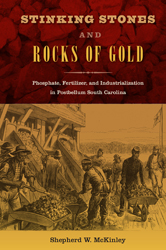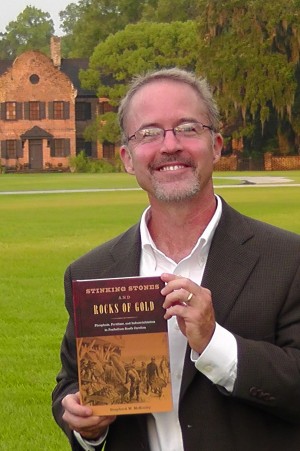UNC Charlotte historian Shepherd W. McKinley’s book, Stinking Stones and Rocks of Gold: Phosphate, Fertilizer, and Industrialization in Postbellum South Carolina, has been named the best book of South Carolina history published last year, as the winner of the South Carolina Historical Society’s 2014 George C. Rogers Jr. Book Award.
The editor and editorial board of the South Carolina Historical Magazine chose the book as a finalist, and an independent panel of three judges named it the winner. McKinley, a senior lecturer and undergraduate advisor in the Department of History, will accept the award at the 2015 Annual Meeting of the South Carolina Historical Society in Charleston on February 28.
McKinley’s book is the first book written about how phosphate mining affected the South Carolina plantation economy. His research considered how the convergence of the phosphate and fertilizer industries held significant and long-lasting impacts for America and the American South. The book explores business, labor, social, and economic aspects, while also detailing the influence on a variety of people in the post-emancipation American South.
Phosphate mining offered plantation owners a way to recover from the losses they experienced from emancipation. Mining also provided a new option for sharecroppers, which allowed freed people to obtain labor concessions, housing, and other economic benefits.
 “My book actually investigates three related industries – phosphate mining on private lands, phosphate mining on state regulated rivers, and fertilizer manufacture – using that mined phosphate,” McKinley said.
“My book actually investigates three related industries – phosphate mining on private lands, phosphate mining on state regulated rivers, and fertilizer manufacture – using that mined phosphate,” McKinley said.
“Besides the importance of industrialization in the South Carolina lowcountry and the freed slaves’ transitions to free laborers after emancipation, a third point I try to make in the book is that those three industries and the workers and entrepreneurs – often former slave owners – who built them created the South’s fertilizer revolution,” he said. “As a result of that revolution and other developments, ‘King Cotton’ spread quickly throughout the South after the Civil War and mired the region in poverty until after WWII.”
McKinley’s interest in this topic began with his dissertation when he was a tourist visiting Drayton Hall plantation outside Charleston. “The historical interpreter who told me about these industries was the son of phosphate miners and the grandson of slaves,” he said. “I realized that there was not much written about this very important topic. And then there’s Charleston… who wouldn’t want to spend a lot of time in Charleston?”
Extensive Research Shapes Book
To research the topic, he did extensive archival research at the SC Historical Society, the Charleston Museum, and other places, and interviewed Richmond Bowens, the historical interpreter at Drayton Hall. “I also became a sort of Indiana Jones, searching for physical evidence of phosphate mining and fertilizer manufacturing at various plantations and industrial locations throughout the South Carolina lowcountry between Charleston and Beaufort,” McKinley said.
Scholars greeted the book as a detailed portrait of industry in the New South. The book is “a finely layered and important study that fills in gaps in the industrial history of the New South and especially low-country South Carolina,” said Sidney Bland, author of Preserving Charleston’s Past, Shaping Its Future: The Life and Times of Susan Pringle Frost.
Charles Holden, author of In the Great Maelstrom, described the book as one that blurs the traditional line between the Old South and New South economies, rendering ” a nuanced picture of the new labor relations in the post-slavery era.”
McKinley has integrated his research findings and techniques in the classroom. “I teach several classes on the New South era, and I try to make my students aware of the important transitions that were happening during that period, transitions that included industrialization and scientific farming,” he said. “Just yesterday, I was showing a student in my HIST2600 class some photos of 1878 convict lease records of phosphate miners who were ‘recaptured after escaping.’ I also emphasize the importance of proofreading and editing anything they write by bringing up examples from the long journey from my 900-page dissertation to my 300-page book.”
McKinley earned his Ph.D. from the University of Delaware (Hagley Fellowship Program), his master’s degree from UNC Charlotte, and his bachelor’s degree from Duke University. His research interests include South Carolina phosphate and fertilizer industries, southern industrialization, emancipation, Reconstruction, Redemption, southern conservatives 1865-1920, southern business and labor 1865-1920, convict labor, Jim Crow, industrial pollution, and advertising. His current project involves United States bankers and banking in the Dominican Republic during the Trujillo regime, 1920s-1930s.
In addition to his award-winning book, he is co-editor with his UNC Charlotte colleague Steve Sabol of a forthcoming book, documentary, and associated conference, titled the North Carolina During the First World War, 1914-1922 Project (2015-2016) and co-author of the 2006 book, North Carolina: New Directions for an Old Land.
Words: Lynn Roberson, CLAS Communications Director
Image: Courtesy of McKinley








